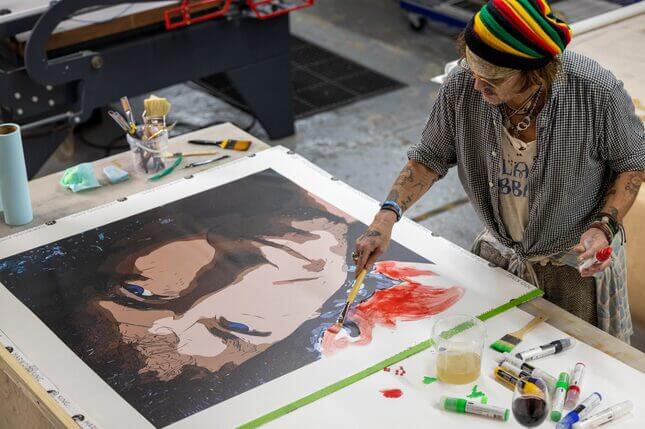Johnny Depp’s Art Sells for Millions, ‘Breaks Internet’ As He Rides Wave of Post-Trial Popularity
The man could probably sell a bag of his own shit for millions--he's more beloved than ever now. We should probably discuss that.
In Depth

In another life, Johnny Depp was an actor—eccentric, at best, and known to be violent, abrasive, and difficult to work with, at worst. He played a quirky pirate with a ride at Disneyland, and he did some other projects now and then. Today, he’s taken on a new life altogether, something between all-American rockstar and transcendent Greek god. Case in point: A collection of his mediocre art has reportedly broken the internet, selling for millions, per a New York Post report on Friday. The art apparently sold out within hours, raked in $3.6 million, and drew so much interest that it crashed the website of the UK gallery hosting it. This, of course, comes weeks after Depp rolled out a new album and filled arenas with his band on tour.
What happened between then and now, you ask? Earlier this year, at Depp’s behest, the trial for his lawsuit against ex-wife Amber Heard was publicly televised. The lawsuit concerned whether Heard had defamed Depp by writing about surviving domestic violence two years after publicly accusing him of abuse.
Over the course of the trial throughout April and May, and in the weeks since, Depp has emerged as something of a national hero. It’s not just the massive popularity of his art and music, which few knew existed before any of this. This man could quite literally sell a plastic bag of his own shit on eBay for millions to adoring men’s rights activists, as well as plenty of members of mainstream society. If you so much as breathe a word in support of Heard and other victims, hordes of both bots and—alarmingly enough—real people will pile onto you seemingly out of nowhere—some will hurl hashtags like #AmberHeardIsAnAbuse or #AmberHeardIsALiar; others might use a photo of one of your deceased family members to create a fake account and troll you.
A woman said Depp raped her with a liquor bottle, nearly killed her, and beat her in front of his own staff who declined to intervene. Depp responded by capitalizing on a prolonged moment of intense, anti-MeToo backlash to use Heard as a stand-in for all women who have ever accused men of abuse—and he won. We can try to write off massive public support for Depp as coming exclusively from incels and MRA’s, but they alone didn’t spend $3.6 million on his paintings—Depp has become extremely popular in the mainstream, more popular than ever. And this simply wouldn’t have happened if he hadn’t abused and subsequently, very publicly humiliated and retraumatized Amber Heard.
-

-

-

-

-

-

-

-

-

-

-

-

-

-

-

-

-

-

-

-

-

-

-

-

-

-

-

-

-

-

-

-

-

-

-

-

-

-

-

-








































